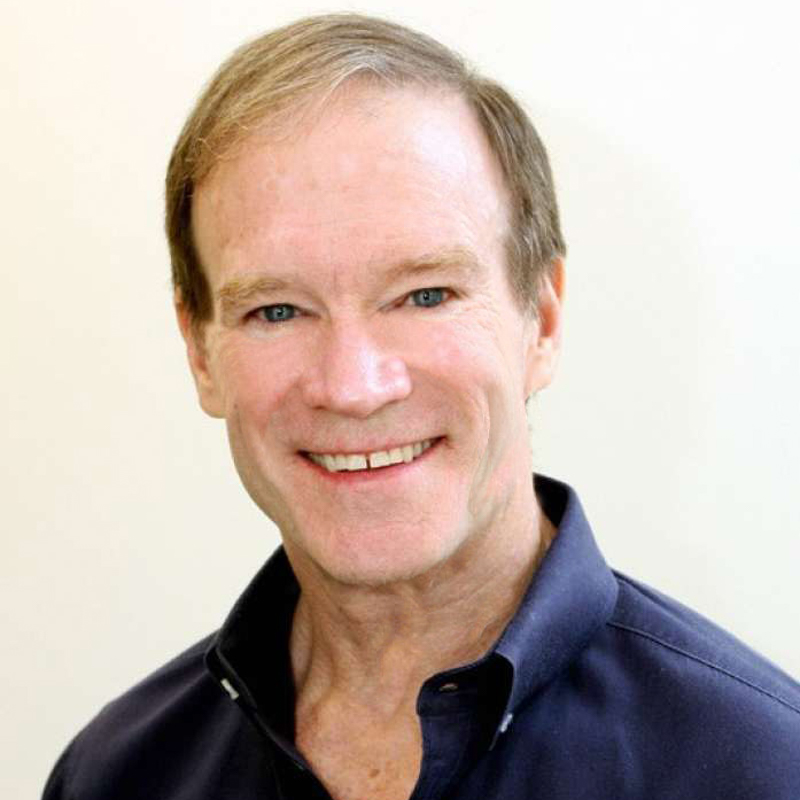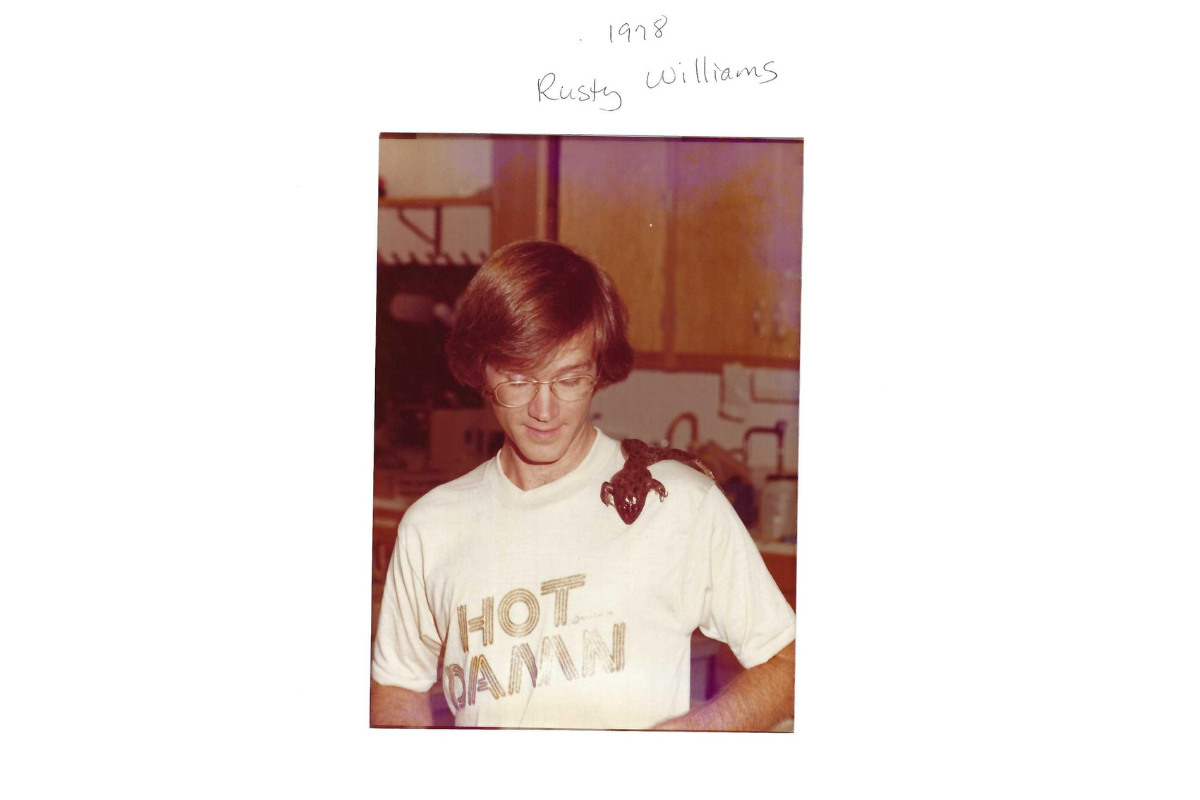In 1984, Lewis “Rusty” Williams boarded a flight from Boston to San Francisco and took the last open seat near the back of the plane. Williams, then a doctor and professor of medicine, introduced himself to a man, one seat over, draped in an orange robe. For the next six hours, the two discussed everything from life and science to the pursuit of knowledge.
The conversation ended only because the flight did. As the man took leave, he handed Williams a note in Sanskrit, “A wise man always keeps learning.”
Williams did learn — later that day, in fact. Exiting the plane, he saw reporters at the gate swarming his flight companion. Unbeknownst to Williams, his orange-clad confidante, was, in fact, the Dalai Lama.
“I took his words to heart,” says Williams, who carried the Sanskrit message through an uncharted and unexpected career path.
Now, as he takes on his newest role as a board member at the Institute for Protein Innovation (IPI), he hopes to share a lifetime of wisdom with IPI’s protein scientists to help them impact the larger biomedical community.
A chemist, a linebacker and a guitarist meet in the hospital
Williams grew up in northeast Georgia, where he’d roam the Appalachian Mountains looking for critters. When a neighbor headed off to the Vietnam War, he left Williams with a stack of Scientific American magazines. Williams poured over the pages and quickly traded biology for the lure of the “hard” sciences.

A scholarship drew him to Rice University where he studied Chemistry and played football. A severe knee injury in his last year cut short his sports aspirations. He dropped out, started a band called “Rusty and the Oxidations,” and briefly dreamt of a career as a chemistry-inspired rock musician.
Ironically, it was the knee — and its injury — that pointed him down another path.
Doctors “patched me up,” he says. “That kind of launched me into the life sciences.”
Even without an undergraduate degree, his intelligence and potential gained him entry into the M.D.-Ph.D. program at Duke University under advisor Robert Lefkowitz, who later won the 2012 Nobel Prize in Chemistry for his discovery of a family of proteins called G-protein coupled receptors.
From there, Williams took a position in the cardiology department at Massachusetts General Hospital and Harvard Medical School. It was the mid-1980’s and Williams had performed many cardiac procedures. But one day, after repairing a coronary artery, he sat back in the catheterization lab, clad in his lead apron, and reflected, “I could be doing this for the rest of my life — or I could try to keep patients from having this problem.”
A snaking career
Prevention requires discovery, and discovery means learning. For Williams, the choice to trade clinic for laboratory was an obvious one.
“I’ve always been eager to change if it seemed like I should,” he says.
He took an academic position at the University of California, San Francisco. As a Howard Hughes Medical Institute Investigator, he and his team of students and postdocs probed biological pathways, leading to the discovery of new drug targets.
While at UCSF, he co-founded his first biotech, Cor Therapeutics, a company interested in snake venoms and, in particular, the antiplatelet activity that facilitates the spread of toxin throughout the body after a snake bite. The researchers suspected this property could be harnessed as a blood thinner or anticoagulant. So, the Cor team acquired 96 venom samples from a snake farm — not far from the terrain where Williams grew up — and tested the samples for antiplatelet agents.
In the venom of Deinagkistrodon acutus, colloquially known as the 100-pace snake, the team found a peptide that interacted with glycoprotein IIb/IIIa. Cor developed the peptide into a blood thinner known as Integrilin, which was approved by the U.S. Food and Drug Administration for the treatment of unstable angina and certain types of heart attacks in 1998.

“It helped a lot of patients,” said Williams, which helped him realize the power that research could have. The Cor team later sold the company to Millennium Pharmaceuticals, which would later become Takeda Oncology. Williams was on a roll.
More than the science
In 1991, he officially moved from academia to industry, taking the position of Chief Scientific Officer and President of Research and Development at Chiron Corporation, a company focused on biopharmaceuticals, vaccines and blood testing. Though he’d been running a lab for years, the shift thrust him onto a sharp learning curve.
“Organizationally, it’s a different mindset,” he says. “There was more to it than the science.”
He soon learned the ins and outs of running a large biotech group. When Novartis Vaccines and Diagnostics acquired Chiron, Williams left to found his own company, Five Prime Therapeutics, centered on protein drug discovery.
The team set out to make a library of every single extracellular protein with correct function and folding. From that library, the scientists could screen proteins in cell-based assays and animals to build a vast database of extracellular protein activity.
“It was a tremendous amount of work,” he says. “But the crew we had was just amazing.”
Eventually, one of the projects they started turned out a drug called bemarituzumab, an antibody targeting fibroblast growth factor receptor 2 (FGFR2b). It is used in conjunction with chemotherapy to treat gastric adenocarcinoma, the most common type of stomach cancer, and gastroesophageal junction adenocarcinoma, a rare form of cancer affecting the esophagus. In 2021, Five Prime and its extracellular protein library were acquired by Amgen, Inc. for $1.9 billion.
A protein push
In 2019, Williams, now a biotech veteran, founded his third company, Walking Fish Therapeutics, a cell therapy company hoping to harness the power of B cells as protein factories and immune modulators. The company, now in its early stages, is the latest iteration of his lifelong interest in protein science — a field that Williams feels sits firmly at the nexus of art and science.
“If you want to be a protein chemist, you … have to harken to your experience of how certain classes of proteins behave,” he says, “and then you have to be creative.”
He sees that creativity on display at IPI in the Institute’s academic and industrial approach, coupling discovery science with an innovative yeast display platform. He also is drawn to the science team, gathered with clear intention, and to IPI’s stellar Board of Directors.
On a more personal note, what remains compelling for Williams is sharing his wisdom and watching a talented group learn how to push a mission-driven, emerging nonprofit to unimagined heights.
“I like the idea of having an institute really focused on proteins,” he says. “It’s unique. I think IPI can benefit academic people, science in general and drug development.”
Source: Rusty Williams, rusty@walkingfishtx.com
Writer: Caitlin Faulds, caitlin.faulds@proteininnovation.org
About IPI
The Institute for Protein Innovation is pioneering a new approach to scientific discovery and collaboration. As a nonprofit research institute, we provide the biomedical research community with synthetic antibodies and deep protein expertise, empowering scientists to explore fundamental biological processes and pinpoint new targets for therapeutic development. Our mission is to advance protein science to accelerate research and improve human health. For more information, visit proteininnovation.org or follow us on social media, @ipiproteins.


